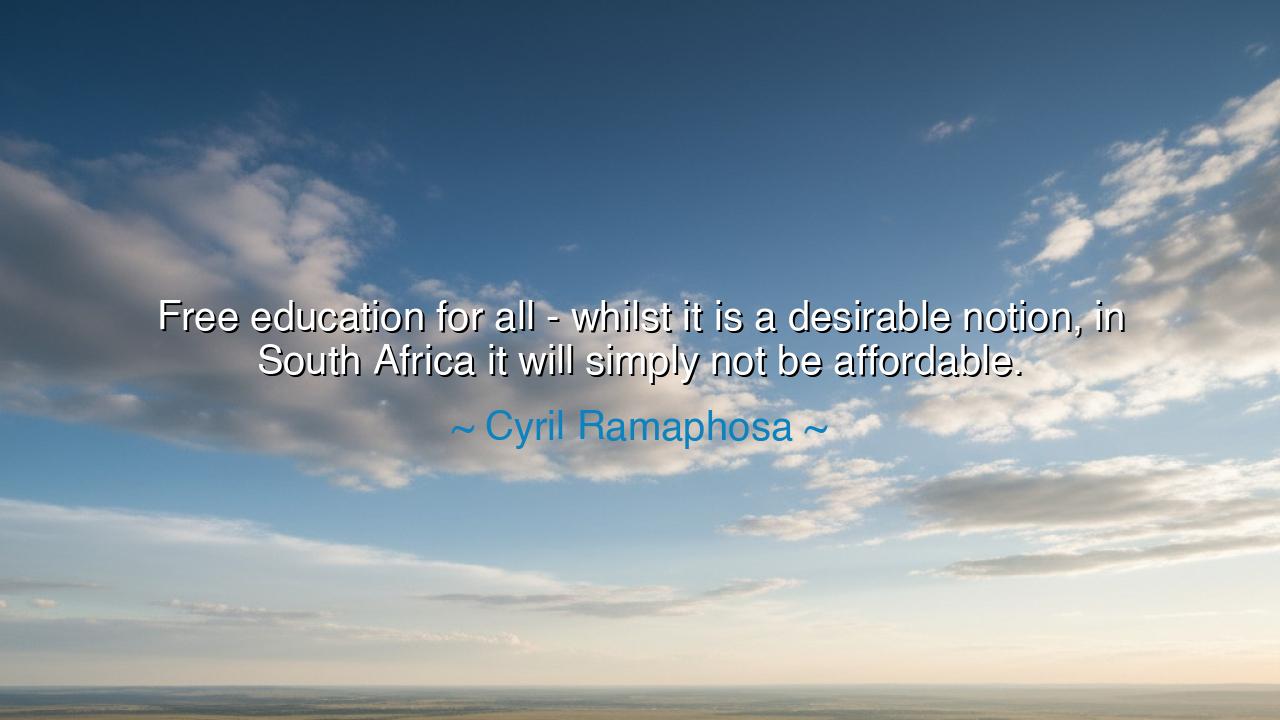
Free education for all - whilst it is a desirable notion, in
Free education for all - whilst it is a desirable notion, in South Africa it will simply not be affordable.






Cyril Ramaphosa once declared with the gravity of a statesman: “Free education for all—whilst it is a desirable notion, in South Africa it will simply not be affordable.” These words rise from a place of hope tempered by harsh reality. They reveal the eternal tension between dreams and limits, between what the heart desires and what the hand can hold. In them, we hear the voice of a leader who longs for justice, yet must wrestle with the iron laws of economics and scarcity. It is not a denial of vision, but a warning that vision alone cannot sustain the multitude.
The meaning of this quote is not to reject free education, but to recognize the burden of making it real. For education is not mere parchment and ink—it requires teachers, buildings, books, and bread for the children who learn. A nation torn by inequality and poverty may dream of universal schooling, yet must also reckon with debts, deficits, and competing needs. Ramaphosa’s words echo an ancient truth: the noblest dreams must be yoked to the cart of practicality, lest they collapse beneath their own weight.
In South Africa, this cry carries particular weight. For centuries, under colonial rule and apartheid, education was deliberately denied to the majority. Schools for Black children were underfunded, overcrowded, and designed not to liberate but to subjugate. Generations were robbed of opportunity, shackled not only by chains of law but by chains of ignorance. Thus, in the dawn of democracy, the call for free education became more than a policy—it became a cry for justice, a healing of old wounds. Yet the wounds were deep, and the resources to mend them scarce.
Consider the student uprisings of 2015 and 2016, the #FeesMustFall movement. Thousands of young people filled the streets, demanding that universities open their doors to all, regardless of wealth. They marched not in arrogance, but in desperation, for they saw that without education, the promise of democracy was hollow. Their passion shook the nation and forced leaders to act, bringing reforms and subsidies. Yet even then, the reality remained: the treasury was limited, and the dream of truly free education for all could not yet be realized without threatening the fragile stability of the state.
This struggle is not unique to South Africa. History offers many echoes. After World War II, nations like Britain chose to make education more accessible, even while rebuilding from the ashes of war. They taxed themselves heavily, sacrificed comforts, and built schools as fervently as they rebuilt houses. In doing so, they showed that what seems “unaffordable” may become possible when a nation unites behind sacrifice and shared vision. But the lesson is double-edged: even the wealthiest nations must balance idealism with reality, for resources are never infinite.
The deeper wisdom of Ramaphosa’s words is this: dreams must be paired with duty. To call for free education is noble, but to build it requires not only leaders, but citizens willing to shoulder the cost, whether in higher taxes, shared sacrifices, or patient investment across generations. Justice cannot be bought cheaply. To feed the mind of a nation requires resources, planning, and the steady courage to pursue the dream step by step.
So what lesson must you take, child of the future? First, hold fast to the dream of education for all, for it is the key that unlocks the chains of poverty and ignorance. But do not despise the slow work of building it. Work to improve schools where you stand, to mentor those around you, to contribute your skills and your wealth, however small, to the cause of learning. Pressure leaders to prioritize education, but also be prepared to sacrifice for it yourself. For freedom without education is hollow, and education without effort is impossible.
Therefore, remember this truth: ideals alone do not transform nations—it is the marriage of vision and labor, of dream and sacrifice, that builds the future. Ramaphosa’s words remind us that while the road to universal education may be long and costly, it is a road worth walking. Do not lose heart when the journey is hard, for every step taken, every child taught, every mind awakened brings the world closer to the day when education will not be a privilege, but the birthright of all.






AAdministratorAdministrator
Welcome, honored guests. Please leave a comment, we will respond soon